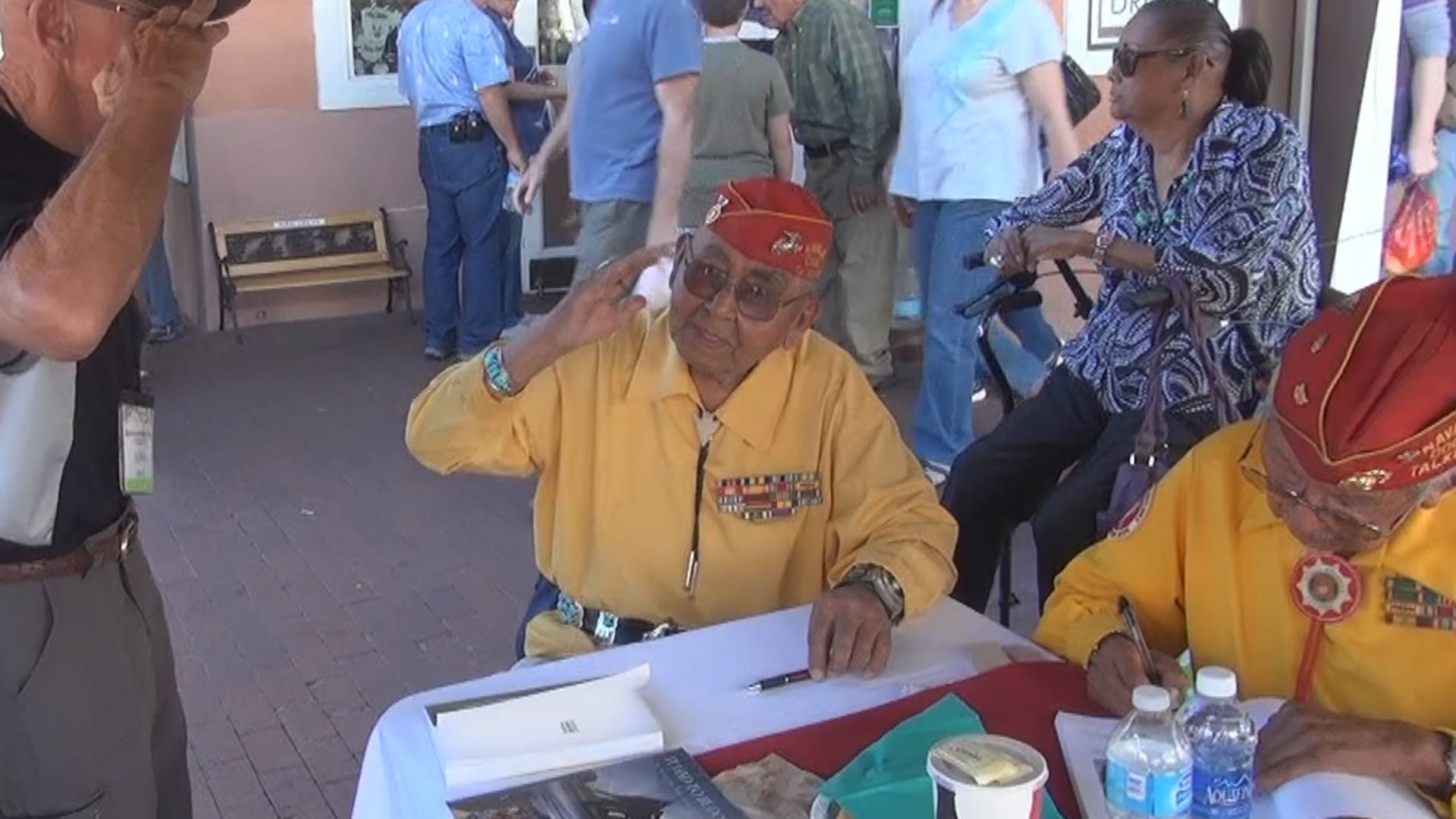
Veterans Day 2019. With everyone posting about their love for the country and to salute those who have served to protect this great land we call home; I thought it would be a nice time to post an old video I shot in 2014 while leading a tour to the Albuquerque Balloon Fiesta.
[arve url=”https://youtu.be/LmDvv9FmHmM” title=”Saluting fellow US Marine Veteran and WW2 Navajo Code Talkers” description=”Tour guest in 2014 saluting surviving WW2 Navajo Code talkers at Albuquerque balloon festival” /]The Honor of Meeting
I have been a Tour Director for over 12 years now. Having been to a lot of wonderful places and I have met a lot of interesting people on my tours. Of the people I have had the good fortune to meet, it is still the highlight and great honor to have been able to meet and talk with three surviving Code Talkers from World War Two.
One of my greatest disappointments was when, in May of 2014, I was at Monument Valley with a tour group and the guide we had told me that we had just missed by 15 minutes, meeting the last surviving Code Talker from the original 29, Chester Nez. I seriously considered leaving my group, hijacking the tour bus and catching up with his vehicle. But I did not.. To make that memory even worse, Chester Nez died shortly after that, on June 4, 2014
Note: I may not have the opportunity to meet the man, however, one of the Navajo Guides handed me his book: Code Talker: The First and Only Memoir By One of the Original Navajo Code Talkers of WWII (Amazon) .
It’s a great book that looks at the historical relationship between the Navajo people, the American government and the real reason the Navajo did what they did for a country that wasn’t exactly nice to them. In it, he talks about the creation of the Code Talkers, as well as what it was like growing up as a Navajo in America. He gives a first-person, not always a kind view of how we/America treated them before, during and after the war.
In his descriptions of the battles and what was happening that you begin to understand the importance of the Code Talkers and how we probably would be all speaking Japanese right now if it wasn’t for this small group of dedicated soldiers…
Saluting The Men Who Served
This video was shot literally at the last minute. The group was on a trolly tour of “Old Town” and the festival for the Balloon Fiesta when we saw this table in the distance. My guest jumped off the trolly, grabbing my arm and raced across the courtyard. Pushing his cellphone into my hand demanding I take the video… He wanted to salute not only a couple of fellow Marines but the fact that they were Code Talkers. He told me afterward that “I can now die a happy and honorable man”
What I remember of this moment is when my guest had turned to look at me towards the end, he is also looking at a group of people standing behind me in silence and several with a little tear in their eye from what they just saw. That explains his look as he turns back to the men at the table.
I do wish I was a bit more organized at the time and capture the who, when and where of it all! In my defense, that was one chaotic tour and I was trying hard just to keep it all together! However, the Code Talkers were signing the book: It Had to Be Done: The Navajo Code Talkers Remember World War II (Amazon) Another excellent read about the Code talkers and the battles they fought and we won!
Code Talkers History
- The Navajo language is verbal. Prior to WW2, nobody ever wrote it down. So very few people even knew that it existed.
- Although we associate the Code Talkers with the Navajo tribe in the battles in the Japanse islands; other Native American code talkers were used in World War II in different battles. The Lakota, Meskwaki, Mohawk, Comanche, Hopi, Cree and Crow soldiers served in the Pacific, North African, and European theaters.
- The Navajo code talkers received no recognition until the declassification of the operation in 1968. In 1982, the code talkers were given a Certificate of Recognition by US President Ronald Reagan, who also named August 14, 1982, as Navajo Code Talkers Day.
- Contrary to the image portrayed in the movie “WindTalkers with Nicholas Cage” No code talker was in jeopardy of being killed if the secret mission was discovered by the Japanese. They fought right next to the other soldiers’ in the front lines of the battles.
Related Links
- Code Talker: The First and Only Memoir By One of the Original Navajo Code Talkers of WWII (Amazon)
- It Had to Be Done: The Navajo Code Talkers Remember World War II (Amazon)
- WindTalkers with Nicholas Cage” (Amazon)

Be the first to comment